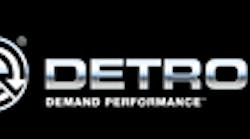GRAPEVINE, TX. Daimler Trucks North America (DTNA) earlier this week announced plans at the American Trucking Assns. Management Conference & Exhibition to bring its own brand of drivetrain components to market in the coming months. The name for the new brand will be “Detroit,” from the famous Detroit Diesel brand. Shed of the word “Diesel,” the name will fit axles, transmissions and other equipment as well as the engine that carried the original Detroit Diesel name for so long.
Selecting a brand name is not a decision to be taken lightly, however, according to Martin Daum, president & CEO of DTNA. Daum spoke with Fleet Owner about the new Detroit brand and what it will mean for the company and its customers.
“Branding is all about a promise for performance,” he said, “and you have to live up to that promise. Detroit is an icon, a brand with a heritage. Sometimes, mergers and acquisitions ruin a brand, but that was not the case with DTNA and Detroit Diesel. We are proud to have that great brand with so many positive attributes connected to it like reliability, fuel-efficiency and power.”
“Of course, if one of your brand name products does not live up to the promise, you damage the whole line,” he noted. “Out of self-defense, we will make very sure not to damage the Detroit brand as we offer new products under that name.”
The development of its own proprietary drivetrain does not mean, however, that DTNA will quit offering components from other suppliers, according to Daum. “We are firmly committed to a two-brand strategy,” he told Fleet Owner. “Those second brands will have a significant share of the business, too.”
Offering two engine makes, two axle brands and two transmissions will give customers the choices they want and improve the strength of both brands because of competition, Daum noted. Our suppliers are also innovative companies, with talented people working for them just like we have. The industry needs all our contributions, he said.
No matter which truck or engine brand you are talking about, a primary concern for fleets is fuel economy, Daum noted. “Fuel economy is so important,” he said. “Most of our customers are concerned about fuel economy, and if they aren’t, they will be.
“Now, what do you think the price of fuel will be in four years?” Daum continued. “Do you think it will drop back down to $2/gal.? Or $3? Or will it go up to $6 to $8? ... That is why, in my opinion, improving fuel economy is the most important thing. [We’ve already improved mpg significantly.] Four years from now, we will be talking about eight to ten miles per gallon. Ultimately, we have to get there.
“Everything that is easy to do has already been invented,” Daum observed. “Now, it will be very expensive to make the next fuel economy gains. It will require huge investments in development. This is the challenge ahead, and we have to make decisions now. I already know exactly what the truck of 2013 will look like. Soon, you will, too. We have to make decisions now about 2014 to 2017 because it will take time.”
According to Daum, it will not be enough to improve truck fuel economy; the industry also has to find a way to do a better job monitoring and improving driver performance. “The biggest variable [in fuel economy] is the driver,” he said. “An individual driver will have at least a 4% spread between his best driving performance and his worst. Now imagine you have 400 drivers. What is the bandwidth of that? Ten percent? Our truck bandwidth is 2%.
“We have to have systems that do a better, more sophisticated analysis of driver performance,” he added. “We have to find ways to isolate the other variables that affect mpg, such as load, wind and terrain to [get a clearer look at what is going on with the driver.] Then we have to train like mad to improve driver performance.
“The other option is to use the truck to make up for the differences in driver performance,” Daum said, “…to mimic the performance of the very best drivers. That is what automation means and it will come over time.” Ultimately, the solution will be a blend of both better training and more automation, he added.
DTNA has already delivered nearly 1,000 hybrids and 1,000 natural gas-powered vehicles, and Daum sees great potential for the future, but he does not view alternative power as a near-term solution to significantly improving the fuel economy of the nation’s fleets.
“Hybrids have huge potential in the medium-duty range, in stop-and-go applications such as school buses,” he noted, “but less in heavy-duty, long-haul trucks. There is just not enough of an efficiency gain with hybrids to offset the higher upfront cost. Now all hybrids require government subsidies, and that is not sustainable.
“To me,” he said, “natural gas is a viable alternative. You do lose some freight efficiency and we need a fueling infrastructure, but they are perfect for hauling shorter distances –for trucks serving ports, for buses or for regional trucks that can fuel centrally.”
When it comes to all-electric trucks, Daum noted that they do not make sense until we have a 100% sustainable electric grid, “Still,” he said, “we have to start today because it will take us 20-30 years to do such an enormous task.”




